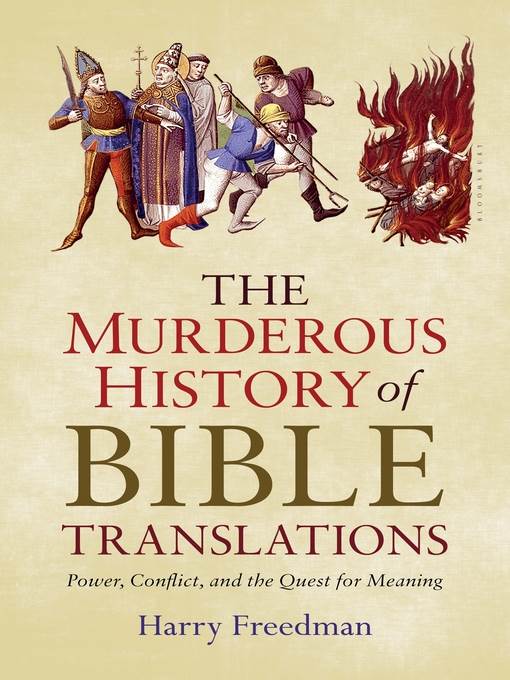
The Murderous History of Bible Translations
Power, Conflict, and the Quest for Meaning
کتاب های مرتبط
- اطلاعات
- نقد و بررسی
- دیدگاه کاربران
نقد و بررسی

September 12, 2016
Aramaic and Hebrew scholar Freedman (The Gospels’ Veiled Agenda) vividly explains how and why scripture has been translated, beginning shortly after the death of Alexander the Great, and carrying through to the present day, including the recent Queen James Bible. The author is open about his populist aim—to tell “the story of the translated Bible,” without being a lengthy comprehensive history that would appeal more to scholars—and he succeeds in achieving that goal. Freedman buttresses his contention that while most translations were undertaken to provide access to the masses, and thus be “radical, liberating, and inspirational,” religious conservatives used translations for the opposite reason, as a “barrier to social evolution.” Freedman also demonstrates the enduring power of word choices, for example, how Jerome’s Vulgate presentation of Moses spawned anti-Semitic superstitions that all Jews had horns, and, even more significantly, how the Septuagint translating the Hebrew word almah as virgin instead of young woman bolstered Christian assertions that the Hebrew Bible foretold the birth of Jesus. For those interested in the complex history of Bible translation, this is a must-read.

September 15, 2016
A retelling of the well-studied history of biblical translation.Freedman (The Talmud: A Biography, 2014), who has a doctorate in Aramaic, provides a basic, serviceable, Western-centered history of the translation of the Bible. Despite the title, only a small portion of his book centers on the gruesome and deadly history of pre-Reformation attempts at Bible translation. The author begins with pre-Christian translations of the Hebrew Bible, such as the Septuagint (Hebrew to Greek) and the Targum (Hebrew to Aramaic). Freedman moves on to cover the storied creation of the Vulgate by Saint Jerome. Eventually, he comes to the age of the Cathars, the French movement ruthlessly suppressed by Rome in the 13th century. "It was the first act," writes Freedman, "in what was to become an endemic, medieval persecution of the translated Bible." At this point, the author delves into names familiar to students of Reformation history and its run-up--e.g., John Wycliffe, the Lollards, Jan Hus, Erasmus, and others. The murder of William Tyndale is at the center of the book. From there on, with the advent of the Reformation, the translation of the Bible became a less and less fearsome act. "With the creation of the King James Bible [in 1611]," writes Freedman, "the age of the Bible translator living in fear for his life had drawn to an end." Indeed, it would be the beginning of an explosion of translation activity, much of which is now largely forgotten. The author ends with the history of 20th-century English translations such as the New Jerusalem Bible, the Revised Standard Version, etc. Strangely, he does not mention such important developments as the New International Version. Freedman does pull in references to non-English translations, but his work is far from a complete translation history. Though it is worthwhile for those with an amateur interest in church history, it offers few new insights and only scratches the surface of global translation history. An interesting read but not an innovative history.
COPYRIGHT(2016) Kirkus Reviews, ALL RIGHTS RESERVED.

August 1, 2016
In this brisk, exciting narrative, Freedman (The Talmud: A Biography) shares some of the most compelling, contentious, and even murderous stories surrounding the many translations of the best-selling book in history, the Bible. Starting with the Greek Septuagint and working all the way up to present-day debates over gender-inclusive language and dynamic equivalence translations, Freedman's account, while not comprehensive, fascinatingly covers a vast range of times, places, and circumstances. Although he details the backgrounds of dozens of translations; highlights include the creation of the King James version; the story of the first female Bible translator, Julia Smith; and the executions of priest Jan Hus and Bible translator William Tyndale. Several themes recur throughout such as the politics of religion, power, and authority, and the emotional impact of familiar religious language. In order to keep the narrative moving, at times Freedman lacks theological nuance, oversimplifying various aspects of Catholic and Reformation theology, for instance. However, as a popular rather than scholarly work, these occasional overgeneralizations are understandable given the book's fast pace and wide accessibility. VERDICT Recommended for general readers interested in the thrilling history of a text many take for granted.--Brian Sullivan, Alfred Univ. Lib., NY
Copyright 2016 Library Journal, LLC Used with permission.

Starred review from July 1, 2016
For readers who take for granted the easy availability of the Bible in every libraryin every hotel room!Freedman's engrossing history of Biblical translations documents the high human cost of such availability. Freedman devotes particular attention to William Tyndale, the brilliant sixteenth-century polyglot strangled and then burned as a heretic by clerics outraged by his challenge to their control of Holy Writ in England. But readers encounter all too many other bold translatorsincluding Jan Hus of Bohemia and Jacob van Liesveldt of Hollandwho paid the same price for similar offenses. Merely reading from the Bible in vernacular Gallic sent the medieval beguine Marguerite Ponte to the stake. Such martyrdom underscores the tensions running throughout a narrative stretching from ancient fights between Jewish and Christian scholars wrangling over the Hebrew word almah, through Reformation-era disputes between Protestant and Catholic exegetes arguing over the Greek word ecclesia, to modern debates between progressives and conservatives split over masculine scriptural pronouns. Despite the rancor, Freedman recognizes that the best Bible translationsincluding the one Luther delivered in painstakingly wrought sixteenth-century German and the one James I commissioned in poetic seventeenth-century Englishhave forever enriched world literature. A fascinating look at the tangled backstory of the Western world's Good Book.(Reprinted with permission of Booklist, copyright 2016, American Library Association.)

























دیدگاه کاربران